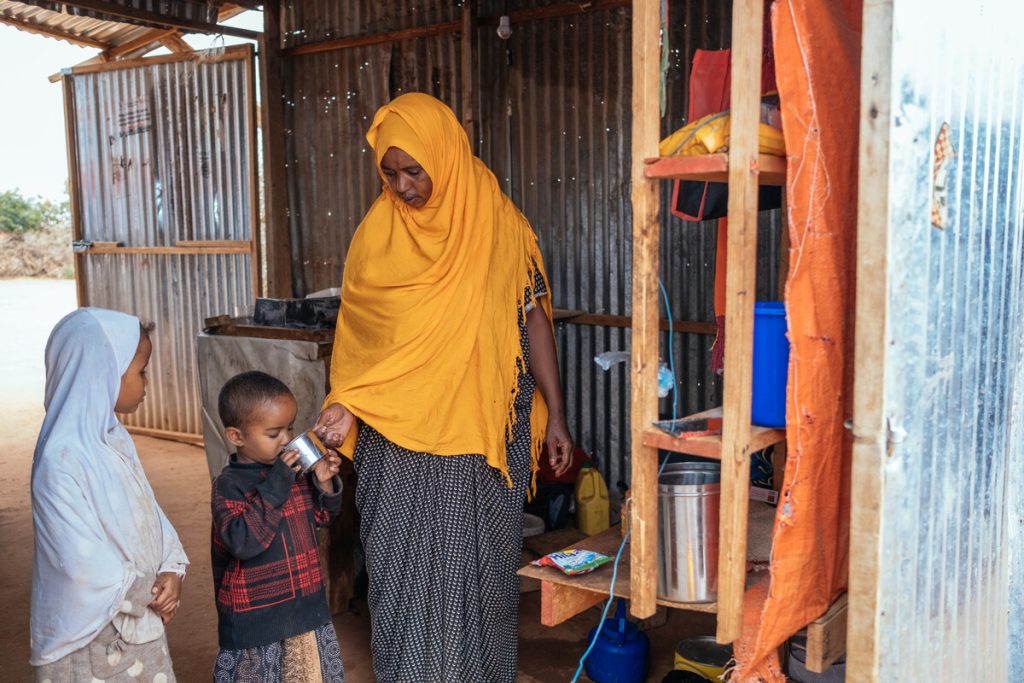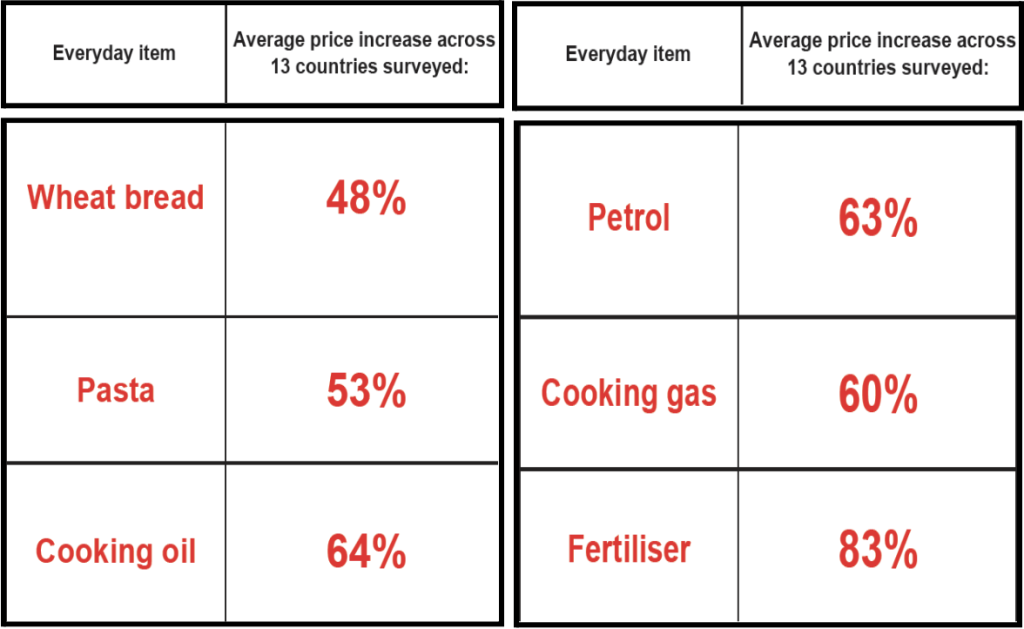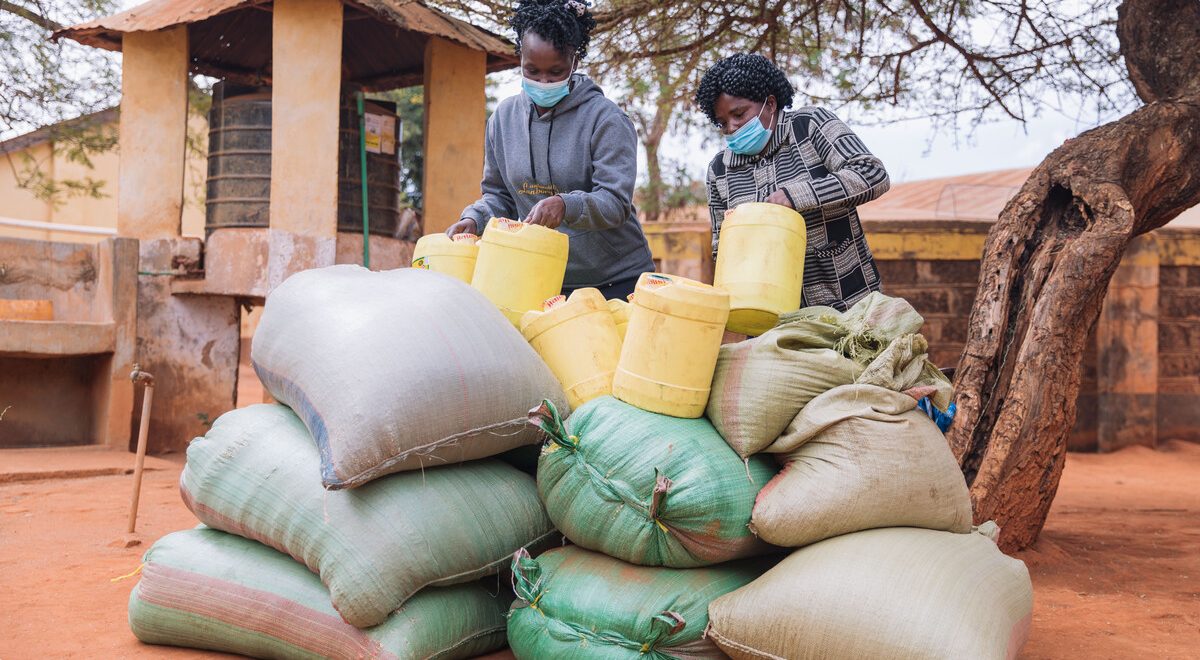Russia and Ukraine have been two of the world’s major exporters of maize, wheat, fuel, and fertilizer. But, the outcome of Russia’s invasion of Ukraine has caused the prices of all these commodities to soar. The impact of this price rise has extended to other parts of the world as well.
Our recent research in 13 countries in Africa, Asia, Latin America, and the Middle East has revealed that people living in poverty have been disproportionately affected by the rise in prices caused by the attack on Ukraine. Within this group, the most disadvantaged have been women.
Some communities have been so severely hit that they are paying double, triple, and sometimes four times the price they were paying for food, fuel, and fertilizer before the Russia-Ukraine war. Communities have had to adjust to price rises as high as 196% for fertilizers, 163% for bread, 253% for fuel, and 275% for pasta.
Because of the persisting conditions, communities living in poverty have no option but to spend most of their incomes on food, making them disproportionately vulnerable to food price fluctuations. Families, especially women, are skipping meals and have no choice but to take their children, especially girls, out of school.

Farming and livestock rearing are the primary sources of income in most of these communities. Now, most people cannot cultivate crops and are selling off the assets required for the future. This is driving them deeper into debt. Those living in regions where pre-existing food insecurity and climate-induced humanitarian crises are already widespread are facing the worst side of the situation.
With the already devastating effects of COVID-19 and climate change, Russia’s invasion of Ukraine has added another layer of difficulties to the day-to-day lives of those living in the Global South. The rapidly increasing prices are paving the way for a global food crisis which will likely worsen and last longer than the food crisis of 2007-08.
Our research, conducted in 40 local communities, compared current prices to those before Russia invaded Ukraine. The report confirms the startling trends that will worsen unless action is taken immediately.

Rising grain prices
The Russian war on Ukraine has worsened the state of global scarcity and market instability, two factors that are contributing to steep price rises. Malawi, Somaliland, Lebanon, and Zimbabwe have reported the increase in bread prices to be over 70%. One community in Somaliland reported an increase of 163% since the start of the war, and one community in Lebanon has reported a price rise of 275% for pasta. The average price for cooking oil has increased by over 60%, but for communities in Somaliland, price increases have been nearly 260%.
Rising fuel prices
One community in Myanmar reported that the cost of petrol increased by 253%, and communities in Zimbabwe have raised concern over the price rise of petrol being as high as 277% and as high as 175% for cooking gas. This is again because of the war on Ukraine and the sanctions on Russia, which is a major producer of the world’s gas and oil.
Rising fertilizer prices
Ukraine and Russia are major global producers of fuel. Synthetic nitrogen fertilizers are an essential component of industrial farming, requiring a large amount of fossil fuels for production. Because of the current price crisis, the worst off are farming communities that have, as a result, become dependent on fertilizers to boost their yields. On average, fertilizer price has already increased by over 80%. One district of Ethiopia has even seen prices go up by as much as 196%!
Planting season is about to begin in many parts of the world, and farming incomes and crop yields will be hit hard.
Matricia Mateche, a single mother of five in Mchinji district, Malawi, expressed that:
“I grow maize and soya beans to support my five children. But this season the high fertilizer prices meant I was unable to grow maize. As of now, I don’t know how I am going to feed my children.”
The war was not the official onset of price rises. Even before it began, prices were rising because of the combined effects of COVID-19, existing conflicts, and climate change. Russia’s invasion of Ukraine has only exacerbated the situation, with families worldwide unable to earn enough to purchase food to meet even their basic needs, while food constantly becomes more and more expensive.
Our recommendations for governments:
ActionAid has four main recommendations for governments to address short and medium-term crises.
- Universal social protection and public services: governments should implement social protection systems, such as cash transfers, food transfers, free school meals, and other social tools, which are essential for supporting communities through the crisis and preventing them from falling deeper into spiraling poverty. Governments must study the key lessons learned from the social protection schemes put in place during the Covid-19 pandemic, as they can also be used to treat and respond to shocks from climate disasters and food crises.
- Agroecology: governments must divert attention to training for and supporting agroecological farming approaches, which use natural and locally available materials to increase soil fertility and organic soil matter. Agroecology allows farmers to reduce their reliance on expensive chemical fertilizers and also strengthens crop and soil resilience to extreme weather patterns caused by climate change. It also significantly reduced greenhouse gas emissions caused by agricultural practices.
- Food reserves: it would be most beneficial for governments reliant on net food imports to invest in long-term measures to build regional and national food reserves that can buffer and reduce vulnerability to food shortages and price rises. This will also allow these governments to intervene to fix prices wherever necessary. A new generation of well-governed and democratically accountable national food reserves can stabilize and smooth out volatile food production and longer-term rural development. The food reserves must ensure accountable, reliable, and efficient distribution systems and involve the participation of smallholder farmers and civil society organizations.
- Shift public and private finance from industrial agriculture and fossil fuels: the major issue here is the imbalance between global financing for fertilizers and fossil fuels and investments in renewable energy and agroecology, with governments investing significantly less in the latter. This leaves the world food system highly vulnerable to conflict, climate change, and global price fluctuations. 87% of agricultural subsidies are socially and environmentally harmful and must be redirected toward the agroecological transition. Governments must also undertake the responsibility of redistributing public and private food and energy funds to achieve a change in the system that will protect the rights of local communities around the world.
Today, we have enough evidence to worry us about what the future may look like if the food crisis remains unsolved. The World Food Program has predicted that this year, up to 323 million people will experience food insecurity if the war continues. This number may increase if global fertilizer prices affect the coming planting season and the global food systems rely on quick fixes rather than well-planned, gradual changes.
What the world needs right now, and what ActionAid is constantly pushing for, are transformed, more reliable, and effective systems that can, if not completely prevent, protect vulnerable local communities across the world so that they can overcome the effects of multiple crises, and live a life where affording even the basic necessities is not an everyday struggle.
More in our latest report.








